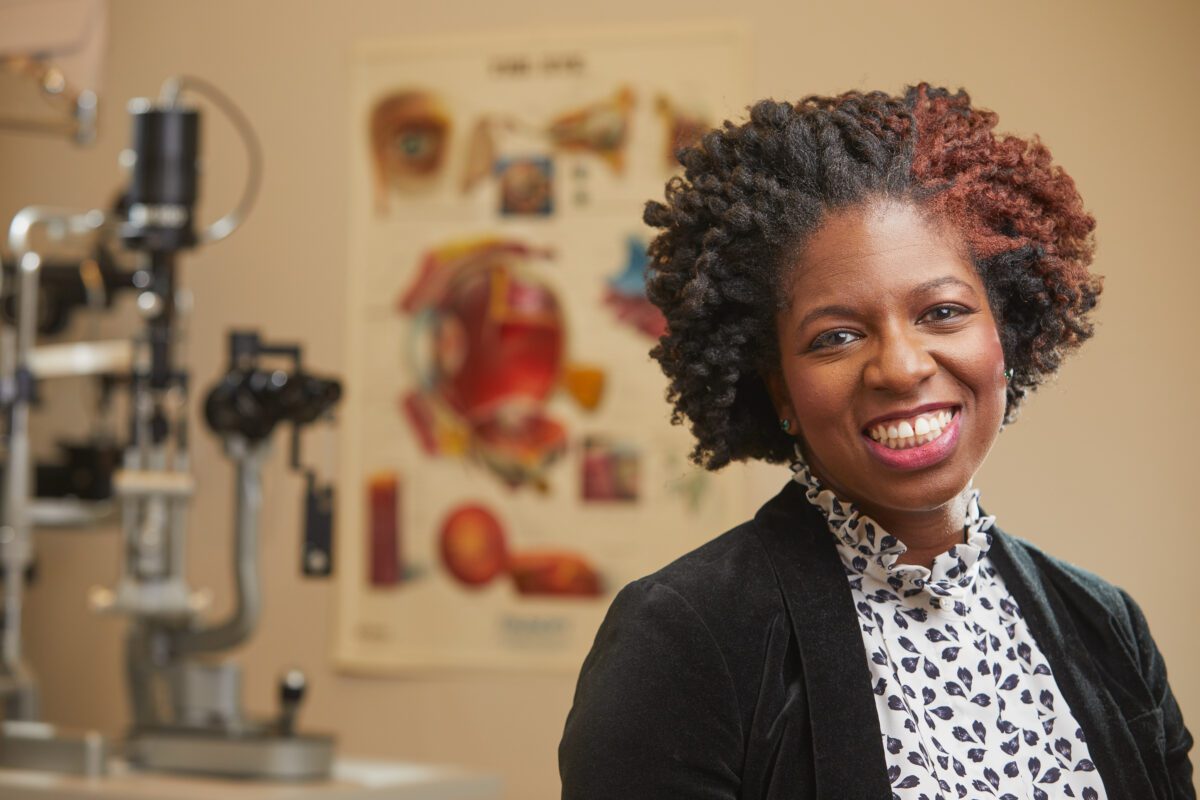Eye Disease in Black Americans: Black History Month is a time to honor the triumphs and struggles of Black Americans throughout history.
It’s also a time to look to the future and activate change. There is much to improve when it comes to the health and wellbeing of Black Americans who are historically at increased risk for many illnesses, including diabetes and diabetes-related eye disease.
Kristen Nwanyanwu, MD, MBA, MHS, a practicing ophthalmologist and vitreoretinal surgeon at Yale School of Medicine, represents one of the many Black American professionals committed to improving the health of her patients. In addition to her clinical work, she serves as the principal investigator for the National Institutes of Health (NIH)-funded Sight-Saving Engagement and Evaluation in New Haven (SEEN) Program, a multi-method approach to identifying and addressing health disparities in diabetic retinopathy.
Diabetic retinopathy is an eye condition that occurs when high blood glucose (blood sugar) levels damage the blood vessels of the retina.[i] Symptoms can include blurred or distorted vision, impaired colors, floating spots, or streaks in one’s vision, and blindness.[ii] Black Americans are at a higher risk for eye disease, including diabetic retinopathy, cataracts, and glaucoma that are likely due to inequities within the health care system.[iii]
“Our country was built on slavery and as a result, our health care system doesn’t adequately serve Black Americans. There is mistrust of the medical community among minorities. We need to work to rebuild that trust,” said Dr. Nwanyanwu. There are more than 825,000 Black Americans in the United States who have diabetic retinopathy.[iv] Tiffani Martin knows the effects all too well.

At five years old, Tiffani was diagnosed with type 1 diabetes. As she got older, specifically during her college years, diabetes management was not a priority in her life and her health and eyesight were negatively impacted. Her health worsened and Tiffani was diagnosed with diabetic retinopathy at just 27 years old. Unfortunately, after eight surgeries on both eyes, she suffered complete vision loss.
Since then, Tiffani has taken great strides to improve her health. Her primary focus has been to advocate for proper diabetes management with healthy lifestyle choices, so no one has to experience the complications she endured. “You don’t die from diabetes, you die from mismanagement,” said Tiffani. One way she has advocated for others is through her participation with Focus on Diabetes™ (FOD), the eye health initiative from the American Diabetes Association® (ADA). FOD was formed by the ADA and Visionary Partners—VSP Vision Care® and Regeneron—to raise awareness of the connection between diabetes and eye health.
Minorities, including Black Americans, have a higher burden of diabetes, worse diabetes control, and are more likely to experience complications[i] due to a combination of risk factors including lack of access to health care and socioeconomic status. However, this does not have to be the case.[ii] Early detection, timely treatment, and appropriate follow-up care can reduce a person’s risk for severe or complete vision loss from diabetes-related eye disease by 95 percent.[iii]
Anyone living with diabetes is at risk for diabetes-related eye diseases, such as diabetic retinopathy. As Tiffani and Dr. Nwanyanwu know, one step you can take to manage your diabetes and eye health by undergoing an annual eye exam from a eye care professional with dilation to allow for a more thorough examination of the eye. An annual eye exam can catch conditions early before permanent damage is done. Some diabetic eye diseases have no signs or symptoms until they are too obvious to ignore, as was the case with Tiffani. But by regularly staying connected with a doctor, you can track any changes to your vision over time and take necessary action before problems get worse.
For some, taking the next step in the eye health journey can be difficult or hard to prioritize. For others, it may be unclear who to go to for help. But it is never too late to get started and take steps toward improving your eye care and overall health. The most important first step is to have more information available regarding diabetes-related eye diseases such as diabetic retinopathy of the symptoms of diabetic macular edema, so people are on the lookout for how their eye health has changed and get look by a professional as soon as they notice any of the symptoms; detecting these diseases early on can be life-changing.This month, encourage your patients to take Dr. Nwanyanwu and Tiffani’s advice by scheduling an annual eye exam and motivate others in the community to get their eyes checked too.
For more information, visit diabetes.org/eyehealth for resources, podcast episodes, guides, and more, including a free Type 2 Diabetes Risk Test and a diabetic retinopathy risk test.
[i] FDA. (2020, April 10). Fighting Diabetes’ Deadly Impact on Minorities. U.S. Food and Drug Administration. Retrieved from https://www.fda.gov/consumers/consumer-updates/fighting-diabetes-deadly-impact-minorities.
[ii] FDA. (2020, April 10). Fighting Diabetes’ Deadly Impact on Minorities. U.S. Food and Drug Administration. Retrieved from https://www.fda.gov/consumers/consumer-updates/fighting-diabetes-deadly-impact-minorities.
[iii] People With Diabetes Can Prevent Vision Loss,” n.d. https://www.nei.nih.gov/sites/default/files/2019-06/diabetes-prevent-vision-loss.pdf.


